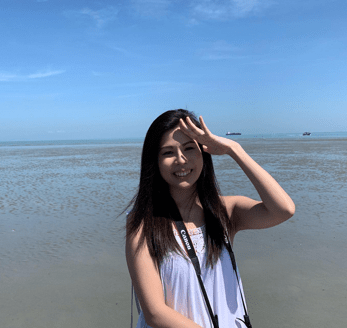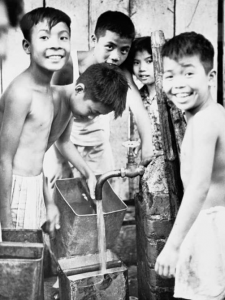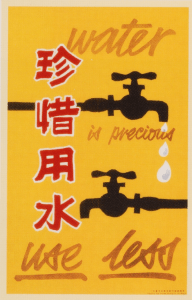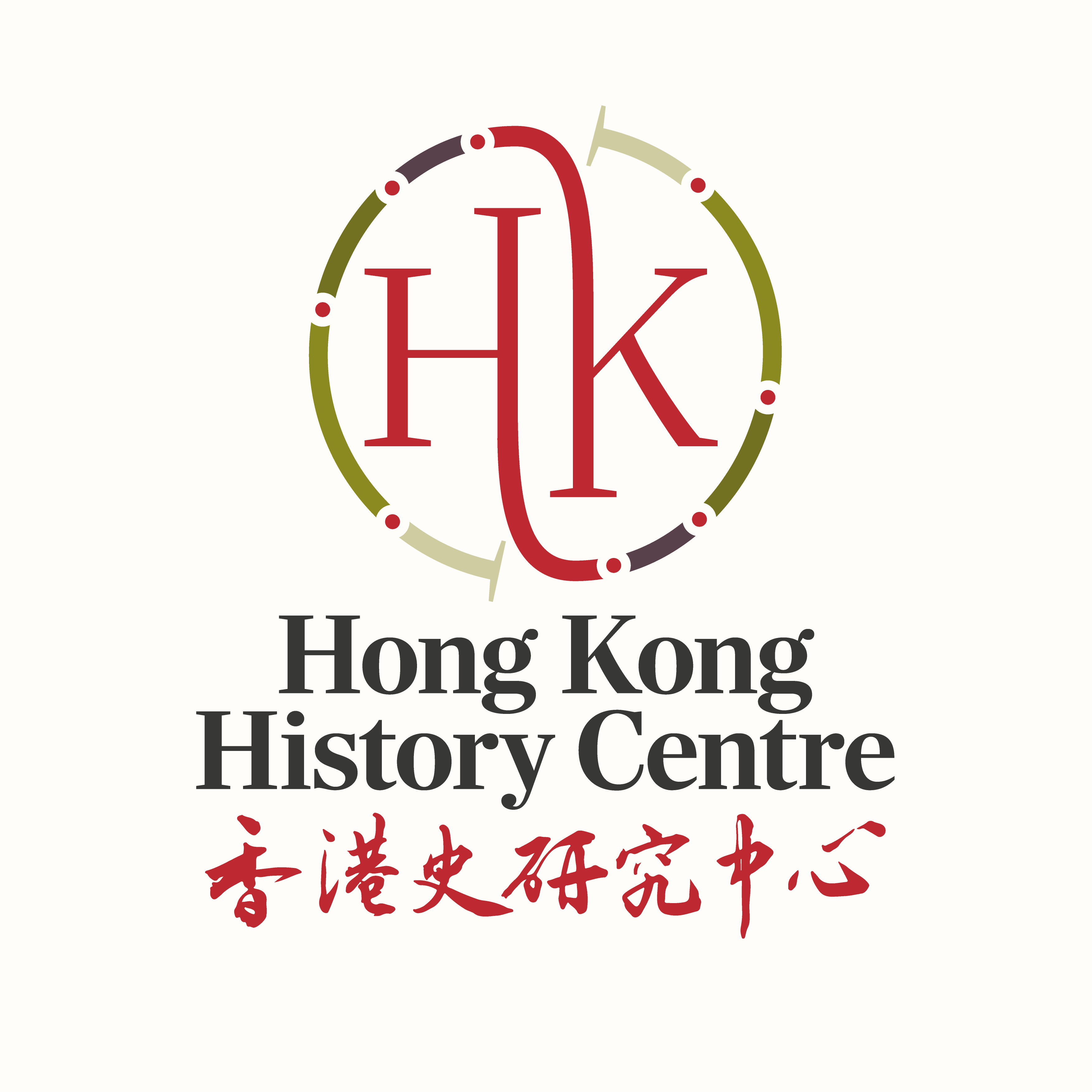This week we have a contribution by Dr. Florence Mok, whose article ‘Public Opinion Polls and Covert Colonialism in British Hong Kong’ in China Information has recently been awarded the Eduard B. Vermeer Prize (congratulations Dr. Mok!). We first met Florence at the University of York, where she completed her PhD on state-society relations in colonial Hong Kong. Now a postdoctoral fellow in the History Department at Nanyang Technological University, Singapore, Florence has kindly accepted our invite to tell us about her academic journey, and her current projects.
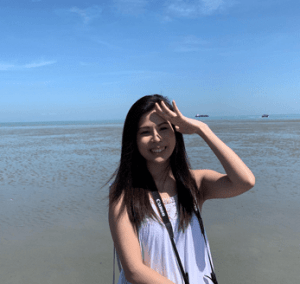 History has always been my passion. I still remember reading my first history book when I was nine. Since then, I have aspired to become a historian. I completed both my BA and MA in Durham University. Prior to my PhD, I specialized in early modern English history. My MA thesis examined Royalism and Royalists during the English Civil War from 1642-1651. The period is fascinating. It witnessed some uncontrollable violence but also the emergence of numerous radical ideas. The world was indeed ‘turned upside down’. As a Hong Kong native, I always found Hong Kong history interesting and wanted to explore how state-society relations evolved from time to time. Inspired by the Umbrella Movement in 2014, I decided to shift my research focus from early modern England to contemporary Hong Kong. I was intrigued by the rise of political activism and wanted to investigate the historical roots of increased political mobilizations and changing political culture in Hong Kong.
History has always been my passion. I still remember reading my first history book when I was nine. Since then, I have aspired to become a historian. I completed both my BA and MA in Durham University. Prior to my PhD, I specialized in early modern English history. My MA thesis examined Royalism and Royalists during the English Civil War from 1642-1651. The period is fascinating. It witnessed some uncontrollable violence but also the emergence of numerous radical ideas. The world was indeed ‘turned upside down’. As a Hong Kong native, I always found Hong Kong history interesting and wanted to explore how state-society relations evolved from time to time. Inspired by the Umbrella Movement in 2014, I decided to shift my research focus from early modern England to contemporary Hong Kong. I was intrigued by the rise of political activism and wanted to investigate the historical roots of increased political mobilizations and changing political culture in Hong Kong.
During my PhD at the University of York, I was supervised by Dr. David Clayton. My PhD thesis examined the relationship between political culture and policy making in British Hong Kong in the long 1970s. Existing scholarship has not addressed the impact of political mobilizations on new administrative, legislative and institutional changes, and the link between political attitudes and social classes. This field remains dominated by the theoretical work of political scientists and sociologists, and is therefore weakly supported by empirical evidence drawn from archival sources. My thesis explored how a reformist colonial administration investigated Chinese political culture, and how activism by social movements in Hong Kong impacted policy making. It investigated how the colonial state monitored public opinion through covert opinion polling exercises, namely Town Talk and MOOD, and how Chinese communities engaged in political movements and discourses, providing a long-term perspective of the constitutional crisis in Hong Kong today. The content was organized using five case studies of social movements/policy making: the Chinese as the official language movement, the anti-corruption campaign, the campaign against telephone rate increases, the Precious Blood Golden Jubilee Secondary School disputes and immigration from Mainland China.
The thesis argued that the colonial administration possessed increased organizational capacity to monitor the movement of opinion direction in the Chinese society closely. Shifting from indirect rule to the City District Officer Scheme, it invested in its surveillance apparatus in the 1970s. Two covert opinion polling exercises, Town Talk and MOOD, were introduced. These constructed ‘public opinions’ were circulated and discussed among high ranked civil servants, including the Governor and policy makers in the Foreign and Commonwealth Office. They affected policy formulation in subtle ways. Hong Kong people had extremely limited democratic rights but the public was involved in the policy making process. The thesis also highlighted how ‘public opinion’ was a construction, and how political cultures in Hong Kong varied in accordance with class and age, and changed in significant ways. For example, the upper class believed that political activism was undignified and undermined political stability. The working class, driven by instrumentalism, distanced themselves from social movements. However, in general, the Chinese communities demonstrated increased readiness to engage in political movements and discourses in the 1970s. I have published the preliminary findings of my thesis as a journal article in China Information.
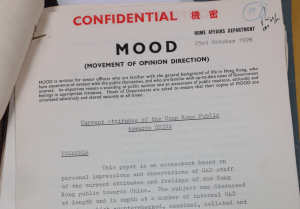
Image of a MOOD document taken by Florence. (HKPRO, HKRS 925-1-1, ‘Current Attitudes of the Hong Kong Public towards China’, MOOD, 23 Oct 1979.)
After completing my PhD, I started working as a postdoctoral fellow in the History Department at Nanyang Technological University in October 2019. I am currently working on two different projects. My postdoctoral project examined Chinese Communist cultural activities in colonial Hong Kong, a pivot in the Cold War, from 1949-1980. It focuses on the four modes of communication used by the Chinese Communists to propagate the Communist regime and expand their influence in the colony: the press, literature, ‘traditional’ cultural activities and school education. The main objective is to investigate through different channels, how the Communists infiltrated Hong Kong society, and to observe how the colonial government countered these activities without, in theory, compromising the concept of ‘the rule of law’. The unexplored primary data in the National Archives in London and the Public Record Office in Hong Kong is rich. The ‘migrated’ Foreign Office Archives are a new source of material. These documents include 110 categories concerning Hong Kong, many of which are related to the organization of sensitive British intelligence and the containment of communism in the colony. This data, which has only come to light in the last few years due to the efforts of lawyers, journalists and historians, will transform our understanding of British colonial history. This study will shed light on the current constitutional crisis in Hong Kong by tracing past Communist activities in the colony and deconstructing the concept and practice of ‘the rule of law’, which is commonly recognized by Hong Kong people as a British legacy.
My second project is a collaboration with my former supervisor, David Clayton. The project focuses on water emergency in Hong Kong in 1963-64. Hong Kong suffered from unprecedented shortages of water then, due to insufficient rain, rapid economic development and under-investment in the water infrastructure. Access to water was rationed, placing severe burdens on Hong Kong households, especially women who had to queue, carry and store water. Our project examines how individuals and social groups responded to these privations, and how this crisis altered their relationship with the colonial state. We are going to assess the level and form of complaints and explain these observations in terms of (i) everyday cultural practices and (ii) a contingent factor: how the crisis was managed by agencies of the colonial states. The project will contribute to environment and social histories of water management, which, hitherto, have focused on rural droughts.


